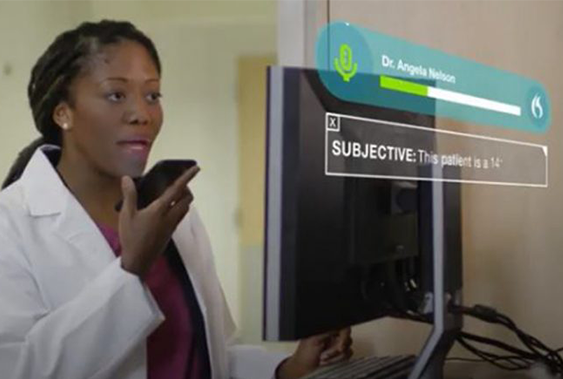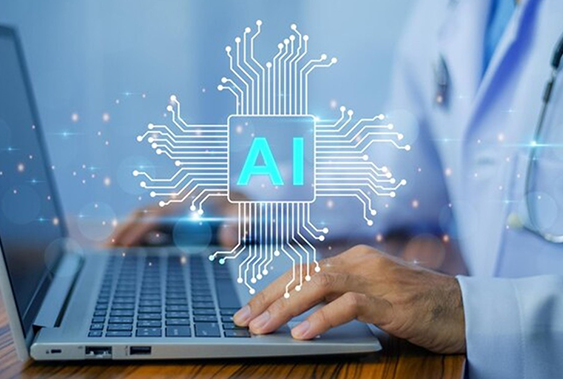The Future of Health Care is Here, and It’s Listening
In the fast-paced world of health care, time is a precious resource. Clinicians aren’t only handling direct patient care, they’re also spending countless hours on administrative tasks, like documenting their patient interactions. The extensive amount of time they’re spending in front of a screen can lead to cognitive burden and reduce their ability to focus completely on patients.
But what if there was a way to capture every detail of a patient’s visit without touching a keyboard? Enter DAX Copilot — the AI-powered ambient listening technology that’s revolutionizing health care by transforming how clinicians work and how patients experience care.
DAX Copilot leverages cutting-edge ambient listening technology and artificial intelligence (AI) to take over the task of documentation. It listens to conversations between clinicians and patients — captures every nuance, medical term and patient concern — processes the information and provides a thorough draft of the patient encounter, organized in a clinical note format that can be quickly reviewed and submitted. This helps clinicians focus less on entering data and more on their patients.
From Burnout to Breakthrough: Putting DAX Copilot to the Test
While DAX Copilot’s potential was promising, the question was how would it perform during real patient interactions? To find out the answer, HM providers across different areas and specialties began a pilot program to put the DAX Copilot to the test.
Starting with approximately 25 physicians and increasing to approximately 80 physicians, the pilot has quickly validated that DAX Copilot and other potential ambient listening technologies can profoundly impact physician practices and patient care delivery. Physicians have been able to focus more on their patients and respond to concerns, without being distracted by having to manually document every detail of the visit. They’re finding that it’s dramatically reducing the amount of time they typically spend on documentation, while still providing highly accurate, detailed clinical notes. With the burden of detailed notetaking lifted, they’re able to have more meaningful, personalized patient interactions.

“Ambient listening in its current form has been one of the most impactful technologies to providers in my over 10 years of being an informatics leader,” said Dr. Jordan Dale, HM chief medical information officer. “The reduction in cognitive burden alone for our busy ambulatory physicians that see 15-25 patients a day has been phenomenal to see.”
“While we’re still working to ensure it’s finetuned for all specialties and in all care domains, I’ve received and seen more emotions of excitement with ambient listening technology than with almost any other technology,” continued Dr. Dale. “It’s significantly reducing administrative burden and returning valuable time to both providers’ patients and their families. Multiple providers have commented that their families are noticing an improvement in their availability during evening ‘family time’ hours, which is typically when many of these providers are having to log in and complete their clinical documentation.”
As of Aug. 1, pilot participants have used over 40,000 ambient listening recordings (multiple ambient recordings can be created during one patient encounter) to complete over 20,000 ambient notes using DAX Copilot.
“DAX Copilot is transforming patient care by allowing physicians to focus on meaningful interactions, instead of typing during visits,” said pilot participant Eleazar Flores, MD, MBA, MSAA, HM Primary Care Group. “It streamlines documentation in real time, providing accurate, insightful records that enhance collaboration across care teams. This technology is just beginning to show its potential in improving efficiency and patient outcomes for everyone involved.”
Another pilot participant, Sudha Nagaraj, MD, Houston Methodist Primary Care Group (PCG) medical director of innovation stated, “The DAX Copilot is giving the gift of time back to both physicians and patients. It’s reducing the documentation burden for our physicians and enhancing the patient experience, giving patients more face-to-face time with their physicians.” Dr. Nagaraj continued, “Also, the accuracy, as well as the speed of note documentation and sign offs are also important organizational tools for patient quality and safety. I’m glad that Houston Methodist is embracing this future state.”
On the Horizon
The success of the DAX Copilot testing is the first step in exploring other ambient listening solutions and is paving the way for use in other clinical roles.
“In October, we’ll kick off a parallel pilot with a new vendor, Ambience. They’ll have more specialty-specific ambient listening models and other potential use cases we can explore, such as multiple language support and suggested coding or diagnosis assistance,” said Dr. Dale. Ambience, while not deeply integrated with Epic today, has some early experience in ED and Inpatient care areas.”
Lisa Stephenson, MSN, RN, NI-BC, chief nursing informatics officer said, “The same ambient listening technology for providers can be used as a foundation for capturing nurse/patient interactions and assessments. The added complexity is taking the information from a narrative format and translating it into discrete elements within flowsheets. We have started discussions with a few vendors to determine how to best adapt this technology to fit nursing’s needs.”
The potential of technologies, like DAX Copilot and Ambience, are boundless. As we look ahead, the promise of these innovations is nothing short of transformative — a health care environment where the burden of documentation fades into the background, allowing clinicians to focus more on the heart of their work — caring for their patients.

